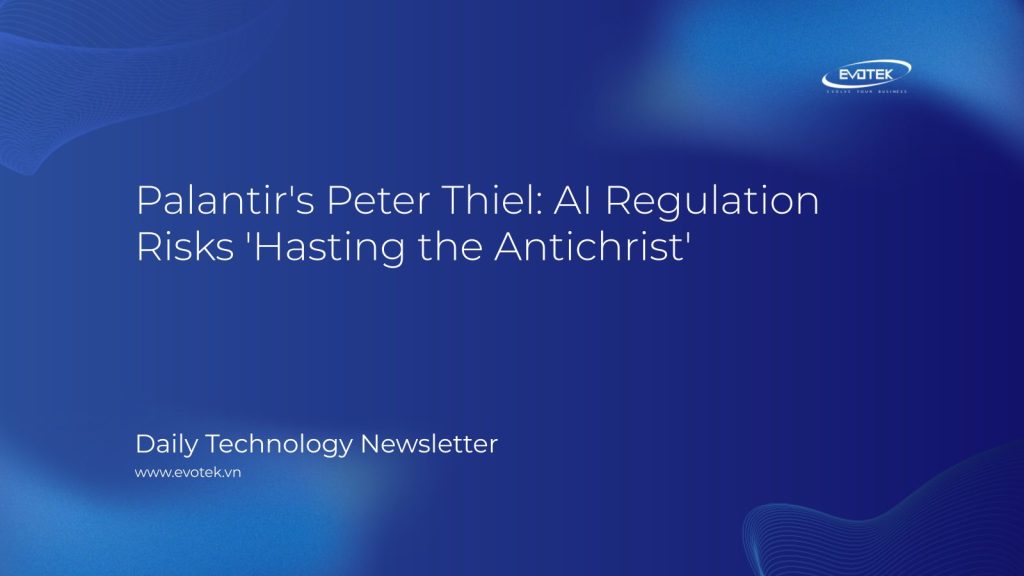A leading voice in the technology sector, Peter Thiel, has reportedly issued a provocative warning, suggesting that efforts to regulate artificial intelligence could inadvertently accelerate the emergence of the Antichrist. This controversial claim surfaced during a recent series of lectures.
The conservative billionaire, renowned for co-founding the data analytics powerhouse Palantir and the payments giant PayPal, is said to have made these comments during an address in San Francisco. According to the Wall Street Journal, which cited event attendees, Thiel, a former donor to Donald Trump and mentor to JD Vance, asserted that an excessive fear or regulation of promising technological and scientific advancements, particularly in the realm of Artificial Intelligence, risks “courting the devil.”
Palantir’s Influence and UK Investment
This theological pronouncement comes amidst significant business activity for Palantir. The company recently announced plans to invest up to £1.5 billion in the UK, a move expected to generate 350 jobs. This investment is part of a broader package of announcements from US technology firms, coinciding with a state visit. The Ministry of Defence is reportedly set to spend up to £750 million on Palantir’s advanced AI technology, which could enhance battlefield targeting capabilities in future conflicts. However, this substantial deal has raised concerns about its potential impact on British companies and local employment.
Thiel’s Faith and the ‘Acts 17 Collective’
Thiel’s deep Christian faith and its intertwining with his business interests have been previously noted, positioning him among several Silicon Valley figures increasingly open about their spiritual beliefs. Currently, Thiel, a significant investor in defense and weapons development, is delivering a sold-out series of lectures focused on the biblical Antichrist. These discussions are organized by the Acts 17 Collective, a non-profit group founded last year by Michelle Stephens. Stephens, a healthcare startup executive, is the wife of Trae Stephens, a partner at Thiel’s venture capital firm, Founders Fund, and co-founder of Anduril Industries, a developer of autonomous weapons systems.
‘Off the Record’ Leak and Warnings
Despite being marketed as “off the record,” notes from the initial lecture were published online by an attendee, software executive Kshitij Kulkarni. Although the post was subsequently removed, it was picked up by the San Francisco Standard. The notes reportedly detailed Thiel’s argument that escalating concerns over existential threats create fertile ground for the Antichrist to rise, promising false peace and safety by stifling technological progress through regulation. Michelle Stephens reportedly informed Kulkarni that his actions violated the strict “off the record” policy, leading to the revocation of his ticket.
This is not Thiel’s first public expression of such apprehensions. He has previously cautioned against the emergence of an individual or system capable of exploiting global fears, especially those driven by AI, to establish a “one-world totalitarian state” that undermines human freedom. Notably, he once controversially suggested climate activist Greta Thunberg could embody the Antichrist, though her name has not reportedly arisen in the current lecture series.
Palantir’s Controversies and Origins
Beyond Thiel’s theological commentaries, Palantir itself has faced scrutiny. Recent reports included former Defence Secretary Sir Ben Wallace referencing efforts to prioritize American equipment procurement to appease a previous US administration. Furthermore, a report to the UN Human Rights Council by special rapporteur Francesca Albanese criticized the involvement of corporations, including Palantir, with Israel and the Israel Defence Forces (IDF). Bloomberg had previously reported the IDF’s alleged use of Palantir’s software for targeting in Gaza.
Palantir has countered these claims, stating that its work in Israel predates recent conflicts and aligns with its global support for US allies and liberal democracies. The company has also vehemently denied “baseless” claims that it developed AI-assisted targeting software allegedly used by the IDF in Gaza or that it is involved with the “Lavender” database for targeting cross-referencing.
Intriguingly, Thiel named the company after the “seeing stones” or crystal balls from J.R.R. Tolkien’s The Lord of the Rings. The firm’s London office is currently led by Louis Mosley, grandson of Oswald Mosley. Palantir’s technology has also been rumored to have played a role in the 2011 operation to locate Osama bin Laden.

 日本語
日本語 한국어
한국어 Tiếng Việt
Tiếng Việt 简体中文
简体中文